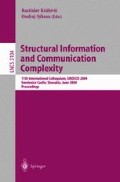Abstract
Link-based information structures such as the web can be enhanced through the addition of hotlinks. Assume that each node in the information structure is associated with a weight representing the access frequency of the node by users. In order to access a particular node, the user has to follow a path leading to it from the root node. By adding new hotlinks to the tree, it may be possible to reduce the access cost of the system, namely, the expected number of steps needed to reach a leaf from the root, assuming the user can decide which hotlinks to follow in each step. The hotlink assignment problem involves finding a set of hotlinks maximizing the gain in the expected cost. The paper addresses this problem in the more realistic greedy user model recently introduced in [3], and presents a polynomial time 2-approximation algorithm for the hotlink assignment problem on trees.
Access this chapter
Tax calculation will be finalised at checkout
Purchases are for personal use only
Preview
Unable to display preview. Download preview PDF.
References
Bose, P., Czyzowicz, J., Gasieniec, L., Kranakis, E., Krizanc, D., Pelc, A., Martin, M.V.: Strategies for hotlink assignments. In: Proc. 11th Symp. on Algorithms and Computation, pp. 23–34 (2000)
Kranakis, E., Krizanc, D., Shende, S.: Approximating hotlink assignments. In: Proc. 12th Symp. on Algorithms and Computation, pp. 756–767 (2001)
Gerstel, O., Kutten, S., Matichin, R., Peleg, D.: Hotlink enhancement algorithms for web directories. In: Proc. 14th Symp. on Algorithms and Computation, pp. 68–77 (2003)
Matichin, R., Peleg, D.: Approximation algorithm for hotlink assignments in web directories. In: Proc. Workshop on Algorithms and Data Structures, pp. 271–280 (2003)
Bose, P., Krizanc, D., Langerman, S., Morin, P.: Asymmetric communication protocols via hotlink assignments. In: Proc. 9th Colloq. on Structural Information and Communication Complexity, pp. 33–39 (2002)
Author information
Authors and Affiliations
Editor information
Editors and Affiliations
Rights and permissions
Copyright information
© 2004 Springer-Verlag Berlin Heidelberg
About this paper
Cite this paper
Matichin, R., Peleg, D. (2004). Approximation Algorithm for Hotlink Assignment in the Greedy Model. In: Královic̆, R., Sýkora, O. (eds) Structural Information and Communication Complexity. SIROCCO 2004. Lecture Notes in Computer Science, vol 3104. Springer, Berlin, Heidelberg. https://doi.org/10.1007/978-3-540-27796-5_21
Download citation
DOI: https://doi.org/10.1007/978-3-540-27796-5_21
Publisher Name: Springer, Berlin, Heidelberg
Print ISBN: 978-3-540-22230-9
Online ISBN: 978-3-540-27796-5
eBook Packages: Springer Book Archive

